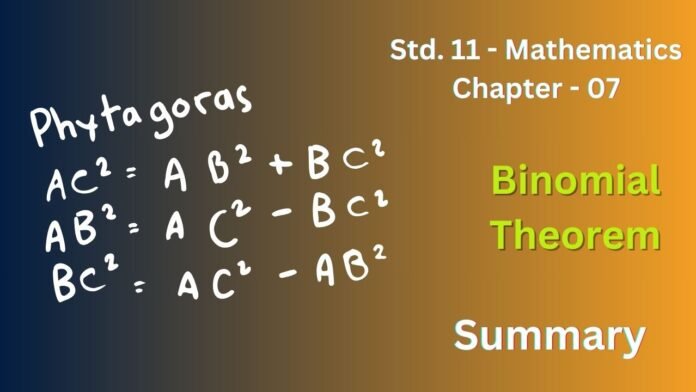NCERT Solutions for Class 11 Maths Chapter 7
Chapter 7.1: Introduction to Binomial Theorem
- Binomial Expression: An expression of the form (a + b)ⁿ, where n is a non-negative integer.
- Binomial Theorem: A formula that expands a binomial expression raised to a power.
Chapter 7.2: General Term in the Expansion of (a + b)ⁿ
- General Term: The rth term in the expansion of (a + b)ⁿ is given by:
- Tᵣ = nCr * a^(n-r) * b^r
Chapter 7.3: Pascal’s Triangle
- Pascal’s Triangle:
- Coefficients in Binomial Expansion: The coefficients in the expansion of (a + b)ⁿ can be found using Pascal’s Triangle.
Key Concepts:
- Binomial expansion
- General term in binomial expansion
- Pascal’s Triangle
- Applications of the Binomial Theorem (e.g., finding specific terms in an expansion, approximating values)
NCERT Solutions for Class 11 Maths Chapter 7
Exercise 7.1
Expand each of the expressions in Exercises 1 to 5.
1. (1–2x) 5
Ans :
o expand the expression (1 – 2x)^5, we can use the Binomial Theorem, which states:
(a + b)^n = nC0 * a^n + nC1 * a^(n-1) * b + nC2 * a^(n-2) * b^2 + … + nCn * b^n
where nCk is the binomial coefficient, given by:
nCk = n! / (k!(n – k)!)
In this case, a = 1, b = -2x, and n = 5. Substituting these values into the Binomial Theorem formula, we get:
(1 – 2x)^5 = 5C0 * 1^5 * (-2x)^0 + 5C1 * 1^4 * (-2x)^1 + 5C2 * 1^3 * (-2x)^2 + 5C3 * 1^2 * (-2x)^3 + 5C4 * 1^1 * (-2x)^4 + 5C5 * 1^0 * (-2x)^5
Now, let’s calculate each term:
- 5C0 * 1^5 * (-2x)^0 = 1
- 5C1 * 1^4 * (-2x)^1 = -10x
- 5C2 * 1^3 * (-2x)^2 = 40x^2
- 5C3 * 1^2 * (-2x)^3 = -80x^3
- 5C4 * 1^1 * (-2x)^4 = 80x^4
- 5C5 * 1^0 * (-2x)^5 = -32x^5
Finally, combining all the terms:
(1 – 2x)^5 = 1 – 10x + 40x^2 – 80x^3 + 80x^4 – 32x^5
Therefore, the expansion of (1 – 2x)^5 is:
1 – 10x + 40x^2 – 80x^3 + 80x^4 – 32x^5
2.
Ans :
3. (2x – 3)6
Ans :
4.
Ans :
5.
Ans :
Using binomial theorem, evaluate each of the following
6. (96)3
Ans :
7. (102)5
Ans :
In this case, a = 100, b = 2, and n = 5. Substituting these values into the binomial theorem formula, we get:
(100 + 2)^5 = 5C0 * 100^5 * 2^0 + 5C1 * 100^4 * 2^1 + 5C2 * 100^3 * 2^2 + 5C3 * 100^2 * 2^3 + 5C4 * 100^1 * 2^4 + 5C5 * 100^0 * 2^5
Now, let’s calculate each term:
- 5C0 * 100^5 * 2^0 = 1 * 10000000000 * 1 = 10000000000
- 5C1 * 100^4 * 2^1 = 5 * 100000000 * 2 = 1000000000
- 5C2 * 100^3 * 2^2 = 10 * 1000000 * 4 = 40000000
- 5C3 * 100^2 * 2^3 = 10 * 10000 * 8 = 800000
- 5C4 * 100^1 * 2^4 = 5 * 100 * 16 = 80000
- 5C5 * 100^0 * 2^5 = 1 * 1 * 32 = 32
Finally, combining all the terms:
(102)^5 = 10000000000 + 1000000000 + 40000000 + 800000 + 80000 + 32 = 11040808032
Therefore, (102)^5 is equal to 11,040,808,032.
8. (101)4
Ans :
In this case, a = 100, b = 1, and n = 4. Substituting these values into the binomial theorem formula, we get:
(100 + 1)^4 = 4C0 * 100^4 * 1^0 + 4C1 * 100^3 * 1^1 + 4C2 * 100^2 * 1^2 + 4C3 * 100^1 * 1^3 + 4C4 * 100^0 * 1^4
Now, let’s calculate each term:
- 4C0 * 100^4 * 1^0 = 1 * 100000000 * 1 = 100000000
- 4C1 * 100^3 * 1^1 = 4 * 1000000 * 1 = 4000000
- 4C2 * 100^2 * 1^2 = 6 * 10000 * 1 = 60000
- 4C3 * 100^1 * 1^3 = 4 * 100 * 1 = 400
- 4C4 * 100^0 * 1^4 = 1 * 1 * 1 = 1
Finally, combining all the terms:
(101)^4 = 100000000 + 4000000 + 60000 + 400 + 1 = 104060401
Therefore, (101)^4 is equal to 104,060,401.
9. (99)5
Ans :
In this case, a = 100, b = -1, and n = 5. Substituting these values into the binomial theorem formula, we get:
(100 – 1)^5 = 5C0 * 100^5 * (-1)^0 + 5C1 * 100^4 * (-1)^1 + 5C2 * 100^3 * (-1)^2 + 5C3 * 100^2 * (-1)^3 + 5C4 * 100^1 * (-1)^4 + 5C5 * 100^0 * (-1)^5
Now, let’s calculate each term:
- 5C0 * 100^5 * (-1)^0 = 1 * 10000000000 * 1 = 10000000000
- 5C1 * 100^4 * (-1)^1 = 5 * 100000000 * (-1) = -500000000
- 5C2 * 100^3 * (-1)^2 = 10 * 1000000 * 1 = 10000000
- 5C3 * 100^2 * (-1)^3 = 10 * 10000 * (-1) = -100000
- 5C4 * 100^1 * (-1)^4 = 5 * 100 * 1 = 500
- 5C5 * 100^0 * (-1)^5 = 1 * 1 * (-1) = -1
Finally, combining all the terms:
(99)^5 = 10000000000 – 500000000 + 10000000 – 100000 + 500 – 1 = 9509900501
Therefore, (99)^5 is equal to 9,509,900,501.
NCERT Solutions for Class 11 Maths Chapter 7
10. Using Binomial Theorem, indicate which number is larger (1.1)10000 or 1000.
Ans :
11.
Ans :
12.
Ans :
13. Show that 9n+1 – 8n – 9 is divisible by 64, whenever n is a positive integer.
Ans :
14.
Ans :
NCERT Solutions for Class 11 Maths Chapter 7
FAQ’s
What is Class 11 Maths Chapter 7 about?
Class 11 Maths Chapter 7 explains the Binomial Theorem, which helps expand expressions of the form (a+b)n(a + b)^n(a+b)n using binomial coefficients.
Why is the Binomial Theorem important?
It simplifies long algebraic expansions and is widely used in higher mathematics, probability, and competitive exams.
How do NCERT Solutions help in Chapter 7 Binomial Theorem?
NCERT Solutions provide step-by-step methods for expansion and solving numerical problems, making concepts easier to understand.
What are binomial coefficients?
Binomial coefficients are numbers that appear in the expansion of (a+b)n(a + b)^n(a+b)n, represented using combinations like (nr)\binom{n}{r}(rn).


